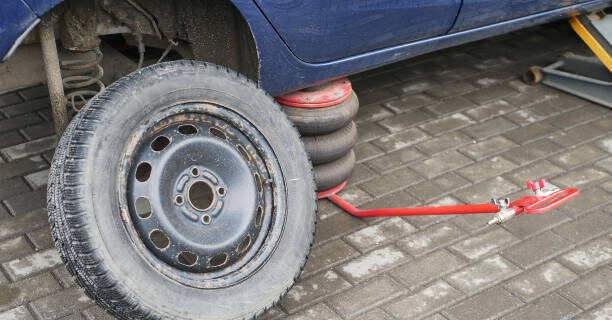Tire blowouts are more than just a hassle; they can turn deadly at highway speed or in a crowded lane. By keeping your tires in good shape, you give yourself the best shot at avoiding that danger. In this post well walk through simple habits that keep rubber healthy and lessen the chance of sudden failure. Well also remind you that quick-response services like Flat Tire Change, towing and roadside assistance Pittsburgh PA,can be lifesavers when trouble does strike.

Understanding the Risks of Tire Blowouts
A blowout happens when a tire loses air so quickly that it feels like an explosion; the change in pressure can toss a car off course. The usual suspects are:
- Too much or too little air
- Treads worn or cracked with age
- A hard hit from a pothole or shard of metal
- Full loads that push weight limits
- Driving fast on compromised rubber
When a blowout strikes, steering and braking become sketchy in an instant. Catching trouble early with routine checks and inspections is your best defense.
Tips for Maintaining Tire Health
Check Tire Pressure Regularly
The right air pressure keeps tires cool, grips the road, and stretches their life. Too little air makes rubber heat up and can finish with a blowout; too much air invites cuts and even wear that sideline the whole set.
- Use a trusted, accurate tire gauge every time you check the pressure.
- Look at the pressure at least once a month and before any big drive.
- Find the right PSI in your owners manual or on the doorjamb sticker.
Inspect Tread Depth
Tread grips the road, especially when it rains or snows, so keep an eye on it.
- Try the penny test: drop a penny in with Lincolns head down. If you see the whole head, get new tires soon.
- The law in many places says tread can be 2/32-inch, but swapping at 4/32 gives extra safety.
Balance and Rotate Tires
Worn patches shorten tire life and make your ride rougher.
- Rotate tires every 5,000 to 7,000 miles so every corner wears the same.
- Ask for wheel balancing now and then to cut shake and smooth steering.
Wheel Alignment
Bad alignment eats tires fast and raises the risk of blowouts at speed.
- Pulling, shaking, or uneven wear are signs that something is off.
- Check the alignment at least once a year or after hitting a curb or deep hole.
Don't Overload Your Vehicle
Every car, truck, or SUV is built to carry only so much weight.
- You can find the official limit in your owners manual or on the sticker inside the drivers door.
- Exceeding that limit strains the suspension and overheats the tires, sometimes ending in a blowout.
Replace Tires When Necessary
Rubber ages even when it looks new, so every set has a time to go.
- As a rule, swap tires every six years no matter how much tread is left.
- Check for cracks, bulges, or vibrations-those are signs telling you the end is near.
What to Do in Case of a Flat or Blowout
Even with good habits, a flat or blowout can happen, so stay ready.
- Stay Calm and Do Not Slam the Brakes Gradually ease off the accelerator and steer to the shoulder.
- Turn on Hazard Lights to warn drivers behind you.
- Call for Professional Help rather than trying to fix the problem in traffic.
In these moments, fast, trusted roadside assistance in Pittsburgh can save you a lot of worry.
Roadside Assistance and Flat-Tire Change Help in Pittsburgh, PA
Whether you live in Pittsburgh or are just passing through, a solid network of towing and roadside crews stands ready to lend a hand. So whether a flat holds you up on a busy downtown street or a sudden blowout leaves you stranded on the Parkway, trained professionals can be on the scene in minutes.
Flat tire change help: rather than wrestle with a heavy jack and cold spare, you can call for a technician who will swap the wheel safely and fast. This service proves especially welcome during torrential rain, biting snow, or any moment when standing by a busy lane doesn’t feel safe.
Pittsburgh towing services: if the damage is worse than a simple tire swap-or if strange sounds hint at deeper trouble-careful towing teams can lift your car and transport it to the nearest garage or to your shop of choice.
Pittsburgh roadside assistance: their full menu includes jump-starts, lock-out rescue, quick fuel drops, and of course flat and spare work, sheltering you with peace of mind every mile.
Conclusion
Your tires touch the asphalt. They carry the weight of steering, braking, and your own safety. Keeping them healthy-refilling air, checking threads, and replacing damaged rubber-keeps control steady and blowouts rare. Be alert to odd vibrations or warning lights, lean on pros when needed, and you can dodge the hassle and peril a ruined tire brings.
If something goes wrong, dependable flat-tire help, towing crews around Pittsburgh, and quick roadside assistance are only one phone call from you. Instead of waiting for a blowout on the highway, take a minute now and look after your tires plus line up trustworthy backup so every trip stays safe and worry-free.
Final Tire Safety Tips & 24/7 Pittsburgh Roadside Support
How often should I check my tire pressure?
You should check tire pressure at least once a month, and before any long drives or when towing. Proper inflation helps prevent overheating and blowouts associated with under‑ or over‑inflated tires.
Why is regular tire inspection important?
Inspect your tires for cracks, bulges, cuts, embedded objects, and uneven wear. These signs can indicate structural issues or alignment problems—addressing them early reduces blowout risk.
